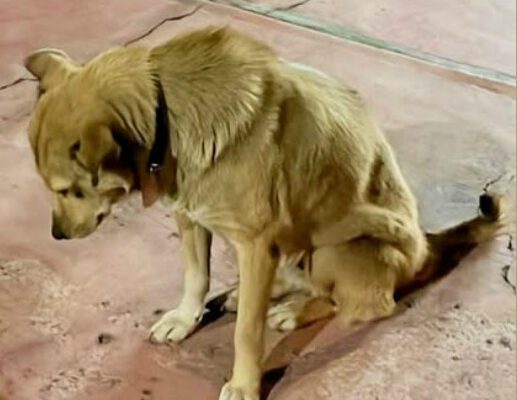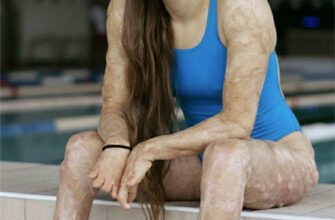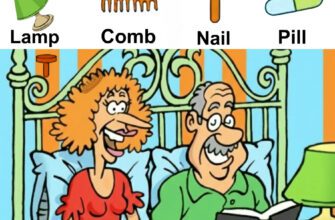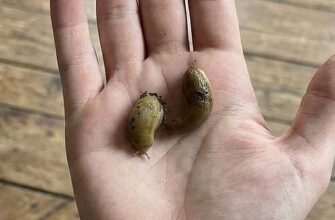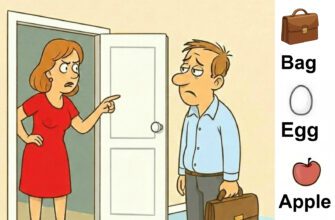He sat on the cracked pink concrete, as if the ground beneath him was the last island on which he could still stand, and looked down at the dark line of the seam where the evening dust was flowing. His head was lowered so low that his ears almost touched his neck; his tail, once probably proud and fluffy, was pulled into a tight, questioning hook; his paws trembled from fatigue and cold. The light from the lantern made his fur, the color of warm honey, even lighter, but this warm color was deceiving: under the fur were sharp bones, on his neck was the mark of an old collar, in his eyes was the habit of looking at the ground so as not to meet the gaze of those who were stronger. I stopped three steps away and involuntarily looked down, where his gaze was directed, as if hoping to see the answer: why was he sitting here alone, why was he not raising his head, why were there so many lights in this city and so few who would notice someone who had sat down and no longer knew where to go.
“Hey, buddy,” I said quietly, and my voice bounced off the empty walls of the courtyard. He twitched his ear, but did not move. I crouched down, turned my palms open so that he could see: there was nothing in them that could hit, and heard my own uninvited monologue: “Just don’t run away. Let me be near. Let me listen to your silence.” He pulled his head into his shoulders a little deeper, and I understood that he would not run, but he was not ready to believe the first time; such dogs do not throw themselves on the neck, they need silence.

The courtyard belonged to a night market: the smell of fried dough and burnt oil hung in the air, someone was laughing at a stall, a courier pushed a cart past and, looking at us, threw over his shoulder: “Is the dog yours?” “Not yet,” I answered. The courier chuckled: “Don’t linger, the guards don’t like it when a gang of animals gathers here.” Something flared up inside me at the word “gang,” but I only nodded. “What’s your name?” I asked the dog. He sniffed slightly: the smell of my hands, the smell of the bag of dry food that I always carried in my bag, the smell of street dust and fatigue. “I’m Kai,” I said, not out loud, but as if mentally introducing myself, “if you agree, we can go together.” I poured a couple of pellets into my palm, placed them on the concrete and moved away. He leaned over, sniffed, took a tiny bite, a second one, and sat down again, not raising his head, but breathing more evenly.
No one comes up to a dog like that by chance, and animals don’t sit like that, looking down, without a reason. On his neck I noticed more than just a mark from a collar — a thin patch of worn fur was like a burn of memory. A collar meant there had once been a house; a house meant there had been a man; a man meant there had been voices, and footsteps, and the smell of bread in the morning. I spoke quietly, almost in a whisper, so that the words would sound not like commands, but like a background of warmth: “I won’t hurt you. I won’t take away your freedom. I’m offering you a choice.” He sighed, and that sigh was like a very small renunciation of the past.
“Sir, take the dog away,” said the guard, who had come out of the booth. “We don’t need a shelter here.”
“He’s just sitting there,” I answered. “He’s cold.” — Everyone is cold, — he snapped. — But the yard is closing.
— Give me ten minutes, — I asked. — Ten minutes — and he will leave with me.
The guard looked at the dog, at my hands, at the open bag of food, then stepped back: — Okay. Just no scenes.
Ten minutes is very little time when you are trying to explain to a creature that only knows the language of pain that hands can be different. I sat sideways so as not to “press” with my gaze, and began to tell him about nothing: about how in my house the wind walks through the kitchen and shakes the curtains; about an old blanket that smells like the sun has remained in its lint; about a bowl that you can eat and refill again, and no one will hit you for it. I spoke and listened to him breathe, and it seemed to me that with each word I said, his breathing became deeper. «If you want, I’ll leave you here,» I thought, «if you’ve chosen this square as your island, I won’t take you away by force. But if you’re tired, let’s try the road.» He looked up for a split second; there was no request in that look, only a check: was I lying?
We took the first step together. I stood up, he rose, staggering, and walked half a step behind. «Kai,» I said out loud, although we hadn’t yet agreed on a name, «let’s go home.» The word «home» was spoken too boldly, but I didn’t correct myself: sometimes a word drags reality along with it. We passed the guard’s booth; he nodded to us sullenly, perhaps remembering someone’s dog, which he hadn’t spoken about for a long time. The night street exhaled with emptiness; I looked back — the dog was walking, not accelerating or lagging behind — and we moved toward the car. He stopped at the open door, lowering his head even lower, as if this door was too similar to those through which he had already been betrayed. I sat down on the seat and began to wait. “Decide for yourself,” I thought out loud, although I understood that right now he needed confidence more than freedom, “we are in no hurry.” He walked around the car, sniffing the tires, the wind, my things, and then jumped in – awkwardly, with a heavy sigh, but finally.
For the first few meters of the road he did not look out the window. He froze, pretending to tolerate whatever was coming. I put my hand on the seat next to him so he could feel its warmth and said, “You don’t have to believe me right away, I understand everything. Your head is hanging down, not because you are guilty, but because you have been made to feel guilty too often. It will pass, honestly. But if you want, just sleep.” Warm breath touched my fingers; he moved slightly; we drove through empty intersections, and each traffic light seemed like a short prayer: if only we could make it in time before he decided to change his mind.
At home he smelled the dry air of the hallway, the silence of the night kitchen, and something that did not smell like a threat. I put down a bowl of water and a bowl of warm broth; he looked at me as if asking for instructions. “You can,” I said. “This is yours.” He took a sip, another, then ate without looking up, but so carefully, as if every crumb was a gift. After eating, I laid out an old mat with a blanket by the wall. He came over and sat down next to me, not on the mat, but on the ground. “It’s softer there,” I grinned to myself and sat down on the floor, leaning against the door. Time dragged on like a thin thread. He laid his muzzle on his paws, and for the first time I heard not anxious, but tired, heavy breathing. I said, “Good night, Kai,” and the light in the hallway became a warm moon.
The morning began not with barking, but with silence. I woke up from someone timidly touching my hand with the edge of their nose. He stood next to me, and there was no emptiness in his eyes from yesterday — a tiny, almost invisible spark appeared there. “Good morning,” I said. He hiccupped from the surprise of his own voice — a quiet «oof» — and took a half-step back. «Let’s go for a walk,» I said as casually as possible, as if we always did this. On the street, he stayed close to the walls, avoided open spaces, and in the park, hearing the squeals of children, he sat down and lowered his head again. «Don’t be afraid,» I said. The boy ran up and asked: «Can I pet him?» — «Not yet,» I answered and heard a new whisper inside: «Give us time.» The vet at the clinic took his temperature, checked his teeth, ears, heart and said: «He’s exhausted, but without criticism. There are parasites, we’ll treat them. He’s very quiet — not vindictive, just used to enduring.» I nodded. «Was he beaten?» — «Rather, driven away. This is a guilty pose — from where they blame you for the very fact of existence.» I put Kai on a leash, he didn’t flinch once, and we went home, where our first long sleep without worry awaited us.
In the following days, I talked to him more than I had to anyone in months. “Look, this is your bowl. This is your water. No one will take it away.” “This is a door, it closes from the outside, not the inside. If you want, we’ll go out. If you don’t want, just lie there and breathe.” “If you get tired of people, I will. If I get tired, remind me to look at the world through your eyes.” He responded with a flick of his tail, a flick of his ear, sometimes raising his head and blinking slowly — and this “slowly” was more important than any words.
He never asked to play, but one day he found a tennis ball in the kitchen and dragged it into the hallway. He sat down, dropped the ball at my feet and looked — not straight ahead, but to the side, like those who never asked. “Do you want me to throw it?” I asked. He didn’t flinch, but when the ball rolled across the floor, he ran after it and returned with his eyes wide with surprise, as if he were discovering a new law of the world: something is given to you — and not taken away. We repeated this several times, and in the end he smiled that timid dog smile, where the half-open mouth and squint are not a threat, but gratitude.
Sometimes at night he still woke up and sat on the floor, staring at where the concrete crack divided the square. I got up, sat down next to him and whispered: «There are no people here who shout. There are no people here who open the door to throw you out. There are only us and silence.» He sighed and lay down again, but closer this time, so that the tip of his tail touched my foot.
A month later we went to that market — not to return, but to pass by. The guard saw us and said: «Well, handsome, you finally got him.» — “You agreed,” I answered. — “Do you have a name?” — “Kai.” — “Seriously? I once had a Kai…” He fell silent, and I realized that somewhere in his memory he, too, had a concrete crack. Kai stood, sniffed the air, and for the first time in a long time, raised his head — high, the way those who are no longer afraid to see someone’s eyes raise theirs.
Sometimes I wondered why he sat there then, on the pink concrete, looking down. Maybe because before they threw him out, someone leaned over and said: “Sit, don’t look at me.” Maybe because stones fly at those who run, and to sit meant to remain whole. Maybe because the ground he looked at was the only constant in his life — it cannot be taken away. I caught myself also starting to look down at my feet more often — not out of fear, but in order to notice in time those who were sitting and did not dare to raise their heads.
With each passing week, Kai became heavier in my arms and lighter in his soul. He learned to greet me at the door without jumping up, but gently placing his muzzle in my palm, like a seal: “I’m here, I’m with you.” On the street, he stopped avoiding children; when a girl dropped her ice cream and burst into tears, he sat down next to her and looked at her with that same warm gaze of his — and the girl laughed through her tears, because there is no lie in that gaze. The neighbors began to greet us first; someone would ask: “Where did you get him?” — “He found me,” I would answer, and I didn’t feel any exaggeration in that.
And yet, he still had the habit of lowering his head when someone suddenly raised their voice in the entryway. Then I would sit down on the floor next to him and say: “It’s not your fault. You don’t have to pretend that you’re guilty.” Sometimes he looked at me as if he was trying to learn this new grammar of life, where “no” means a boundary, not a punishment, where hands are something to stroke, not to lift a belt.
One evening, that same guard wrote to me: “If you need it, I have a kennel. I made it for a dog that is no longer here. Take it.” We arrived, took the kennel, put it on the balcony, filled it with straw — and Kai, as if understanding the symbol, went inside, walked around and lay down, sticking his nose out. I sat down next to him and thought: each of us has our own kennel in our memory — a place where we finally stop shaking.
Six months have passed. Kai no longer looks at the ground when someone extends a hand to him. He looks up, slowly, respectfully, like an adult choosing who to trust. He doesn’t know the commands “sit” and “lie down” like in competitions, but he knows the most important one – “let’s go home”, and every time he hears these words, he takes a step towards me without a shadow of a doubt. Sometimes he still sits down where the sun lays on the asphalt in a round warm spot, and lowers his head – not out of fear, but to feel what today smells like. I sit down next to him and remain silent, and then say my short prayer, which always begins the same way: “Thank you for not running away then”.
And if someone asks me why I should raise those who sit and look at the ground, I will answer: because one day they will raise their eyes to you, and in that look there will be your own saved part. Because the world becomes smaller every time we pass by someone else’s silence. Because sometimes ten minutes are enough for a concrete crack to cease being a border and turn into a line that you step over – and you don’t walk alone.
➕
